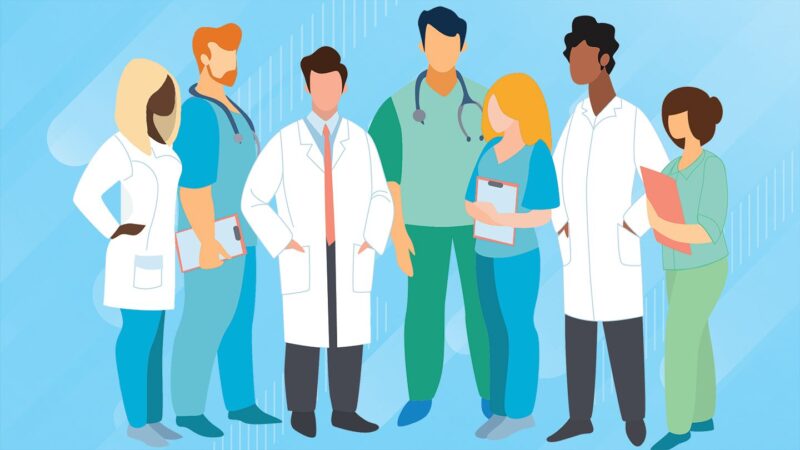A Comprehensive Guide to the Main Careers in Healthcare

There can be no more admirable pursuit of a career pathway than that of a vocational role dedicated to healthcare – one in which professionals decide to dedicate the entirety of their working lives to helping others.
So, whether you are currently working in the field of medicine and are looking for another exciting challenge that offers different responsibilities from your current ones, you are still at high school, college, or university and are deciding what career to choose, or you are ready to apply for a job right now, you have come to the right place for inspiration.
Here, for your information and, of course, for reading pleasure, is a comprehensive guide to the main careers in healthcare.
Dentist
Dentistry is one of the major elements of healthcare that is often forgotten when listing the professions involved in medicine. However, training to become a professional and registered dentist is an in-depth, long, and challenging process.
A professional dentist’s overarching roles and responsibilities involve the diagnosis, prevention, and invasive treatment of any and all health problems, issues, and diseases that affect the mouth, specifically pertaining to the gums and teeth.
Most dentists operating in the United States, as well as the United Kingdom for that matter, have at the very least a postgraduate qualification in dentistry and hold a master’s degree in Science in Dentistry. Furthermore, the vast majority of dentists also hold a doctorate in Dentistry as well.
Of course, the intense and lengthy training and academic research required to become a dentist is reflected in the average annual salary, which in the United States ranges between $155,000 and $158,000 a year. Interestingly, as of 2021, approximately 155,000 professional dentists were working in the field in the country.
-
Registered Nurse
A registered nurse is perhaps one of the most recognized careers in the healthcare sector – both across the length and breadth of this country and internationally.
There is a myriad of pros to choosing to become a nurse, including, but in no way limited to, the following:
- A wealth of different benefits and a highly competitive salary
- A flexible working schedule and shift pattern
- An incredibly fulfilling and rewarding career choice
- Numerous and regular opportunities for advancement
- Highly transferable career skills
- A chance to pursue your passion in a nursing specialism
- Travel opportunities within your professional career journey
- The ability to work in several different professional environments and locations
In the United States, there are several different and perfectly viable ways in which to become a professionally qualified and registered nurse. However, the most beneficial way by far is to choose an online accelerated undergraduate degree program and become a Bachelor of Science in Nursing. If you have always wanted to spend your professional working life dedicated to making a real difference in people’s lives as a registered nurse, then Click Here to find out how advantageous an online accelerated BSN will be.
-
Home Health Aide
When it comes to the field of healthcare, there can be no more respected and crucial profession than that of a home-health aide, especially considering there are technically no formal academic qualifications needed to become one.
Essentially, a home health aide’s main duties and responsibilities include the following:
- Serving, planning, and preparing meals throughout the day and evening
- Monitoring and ensuring that all medication is taken on time and in the appropriate quantities
- Helping with activities that are highly personal such as grooming, dressing, and bathing
- Laundry, dusting, cleaning, and other light housekeeping duties
- Help with using the toilet and other bathroom activities
- Documenting, monitoring, and analyzing an individual’s physical health as well as emotional wellbeing
- Checking vital signs and recording food consumption
- Grocery shopping
- Companionship
Often, home health aides usually work with individuals who are living with one or more disabilities, are cognitively impaired, chronically ill, or elderly with mobility issues.
As of 2021, there are over three and a quarter million home health aides working in the United States who earn between $23,000 and $25,000 a year on average.

-
Pharmacy Technician
An exciting and often challenging role within healthcare, again which is entirely possible to pursue without an undergraduate degree, is that of a pharmacy technician.
The general roles and responsibilities of professional pharmacy technicians center around assisting the pharmacist with anything and everything and therefore require a strong knowledge of a broad spectrum of different prescription drugs and their various uses.
Pharmacy technicians, however, are not qualified to prescribe drugs nor assess their overall suitability in terms of how a drug will affect if at all, any other prescription medication a person is taking at the time.
On the other hand, what pharmacy technicians are fully versed in is this: how to dispense different medications and also determine the exact dosages to ensure the individual is given the right drug at the correct strength.
According to information taken from a 2021 study, the average pharmacy technician earns between $31,000 and $33,000 a year, and there are approximately 412,000 pharmacy technicians currently operating in the United States.
-
Physical Therapist
Physical therapists – who are sometimes called physiotherapists – spend their professional working lives diagnosing the various causes of illnesses and injuries suffered by patients before creating a personalized treatment plan involving manual therapy, electrotherapy, and specific exercises.
There is a multitude of different types of physiotherapy, the most recognized and widely applied ones being:
- Pain management therapy
- Muscle rehabilitation
- Sports physical therapy
- Geriatric physical therapy
- Cardiorespiratory physical therapy
- Pediatric physical therapy
- Women’s health (female reproductive system, childbirth, and postnatal and prenatal care)
- Musco skeletal physiotherapy
In 2021, approximately 247,000 professional physical therapists were operating in the United States, the majority of whom hold a Master of Science in physical therapy. The average yearly salary of an American physical therapist ranges between $86,500 and $89,000.
-
Speech & Language Pathologist
Another fascinating professional specialism under the umbrella of medicine and healthcare is speech and language therapy. Speech and language pathologists work on an individual basis to both diagnose and subsequently treat their patients, who in most cases are living with a reduced level of ability to speak and annunciate clearly and easily.
In addition, speech and language therapists also work with people who have recently been diagnosed with a swallowing disorder, as the techniques they are, experts in can make a significant difference to these individuals as well.
It is entirely possible to pursue a career as a speech and language pathologist with an undergraduate bachelor’s degree in Speech Pathology. Still, it would be advisable to continue your training and successfully acquire a Master of Science in Speech Pathology as well, even at the same time as working in your first professional post.
Throughout 2021, there were around 154,000 professional speech and language pathologists professionally operating in the United States, earning between $76,000 and $79,000 annually.
-
Occupational Therapist
A career as a professional occupational therapist has an exceedingly narrow focus and solely centers around helping individual patients recover from and manage a host of different disabilities and injuries, both of a temporary or more permanent nature.
There is a wealth of technical knowledge that forms the basis of an occupational therapist’s daily roles and responsibilities, and an intensely detailed understanding of the structure of the muscles and bones in the human body is therefore required.
Occupational therapy is a field of healthcare that is currently experiencing somewhat of an exponential rise in demand and, therefore, it would be a wise discipline into which to dive.
Typical duties of an occupational therapist include:
- Evaluating the patient’s workplace and home
- Educating both the patient and family members
- Assessing and documenting how well the patient is looking after themselves
- Providing exercises to alleviate pain
There were approximately 133,500 professional and registered occupational therapists working in this sector in the United States in 2021, each earning on average a whopping $85,000 a year. It would also be pertinent to point out that it is strongly advisable to attain a postgraduate degree, such as the Master of Science in Occupational Therapy, to become an occupational therapist
-
Phlebotomist
Another highly fascinating career pathway into medicine and healthcare is that of a professional phlebotomist. Essentially, a phlebotomist is solely focused on all matters pertaining to blood in the human body and is responsible for the drawing of blood for a variety of reasons; from research projects and blood transfusions to blood tests and blood donation, to name but a few, these specific healthcare professionals work with blood every single day.
There is a particularly complex wealth of medical information and understanding of the processes involved within the human body, which potential phlebotomists must fully absorb themselves. Surprisingly, however, although the academic requirements to become a professional phlebotomist are strict and unwavering, it does not take that long to qualify.
Usually, registered nurses (RNs) or LVNs will work as a phlebotomist as a way of fulfilling the hospital experience requirement part of their studies whilst they complete the theoretical side of their medical training.
As of 2021, there were approximately 126,000 working phlebotomists in the United States, who earned between $32,000 and £34,000 a year.

-
Clinical Laboratory Technician
You may already be familiar with clinical laboratory technicians since their job roles are often portrayed in popular media and television programs, such as ‘The Big Bang Theory.’ Plus, you might also recognize them under their more colloquial title, ‘lab techs.’
In basic terms, the primary duties of a clinical laboratory technician encompass the performance and monitoring of various scientific tests performed in a laboratory setting. Such responsibilities include the collection of multiple tissues and fluids and then the execution of tests centered around what they have collected. After the tests have been completed, the information is then sent to surgeons, physicians, and other medical professionals to analyze and assess further.
Often, professional clinical laboratory technicians have successfully acquired a postgraduate degree in medicine or a doctorate in pharmacology.
According to a 2021 research study, there are approximately 331,000 clinical laboratory technicians who are currently working in the United States, with an average annual salary ranging from $51,000 to $54,000.
-
Medical Transcriptionist
A lesser-known profession within the healthcare sector is the medical transcriptionist. Overall, a qualified medical transcriptionist deals with the accurate analysis of notes taken by nurses, doctors, and other relevant medical workers and professionals during a session or appointment with their patient and turns their words into written records.
There is a myriad of qualities and attributes in an individual which makes them suited for this intense role, mainly because the level of accuracy required is second to none. Although medical transcriptionists go through exceptional amounts of training before they begin their first professional appointment, there is no actual mandatory requirement for a prospective medical transcriptionist to attend university.
In 2021, just under 60,000 medical transcriptionists were working in the United States, earning on average between $34,000 and $37,000 a year.
-
Dietician
There are so many reasons why a career as a professional dietician or nutritionist can provide not only an exciting and rewarding professional daily grind but also enhance your personal life as well. Generally speaking, a dietician has to help patients and clients create individual, unique, and highly customized dietary and meal plans for a host of different reasons.
Perhaps an individual is looking to lose or gain weight, build strength and improve fitness as an athlete, benefit from a balanced diet and become healthier overall, or maybe they have been recently diagnosed with a condition that can be managed through diets, such as diabetes, allergies, or specific food intolerance. No matter their reasons or their qualms, a dietician helps their patients perfect their diet and consumption to maximize their health and performance and assist them in managing certain illnesses and intolerances.
To become a professional nutritionist or dietician, the widely accepted academic level of education you must possess is an undergraduate degree, which ideally should be a BSC Bachelor of Science in Nutrition.
The results of a 2021 study showed that there are approximately 70,000 professional dieticians registered and working in the United States alone whose average income varies between $58,000 and $61,000 per year.






